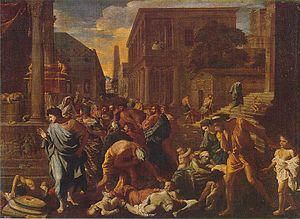 Image via Wikipedia
Image via WikipediaScripture is not only a historically accurate account of Israel’s development as a society and as a people; it is also a dialog with God. While it is possible to read the Bible in its entirety within a few sittings, in much the same way as one would read any other book, it can become fairly dry reading. I feel that God, the King of the Universe, inspired this book so as to enter into a dialog with men.
As God wishes to communicate with us, He calls us by name. In 1 Samuel 3, God called the young prophet/leader Samuel by name and entered into a dialog with him. While Samuel was still a boy, God revealed to him His judgment against the priest Eli, against his sons, and against future generations because Eli did not stop his sons from publicly dishonoring God.
While God’s judgment against the House of Eli may appear severe and intractable, I feel that because Eli and his family were such a high profile family that their relationship with God, or lack thereof, reverberated loudly throughout Israelite society. Since Eli’s sons failed to treat God as Holy, they, in essence, told Israel that their God was simply no god of consequence. They taught Israel that God’s requirements for worship, as stipulated in the Pentateuch, were irrelevant, possibly outdated.
Once God entered into a dialog with Samuel, He continued to reveal Himself to him through his word.
While Samuel was still a boy, a devastating battle with the Philistines cost Israel 30,000 foot soldiers. Eli and his sons died on the same day that the battle was lost. And, the Ark of the Covenant, which was removed from the tabernacle in Shiloh, was captured by the Philistines.
After suffering plagues of tumors and mice for seven months, the Philistines understood that these afflictions were from the God of Israel so they sent the Ark of the Covenant away from their cities and territories. Eventually, the Ark ended up in Israelite territory, in Kireath Jearim, nine miles west of Jerusalem.
For the twenty years that the Ark rested there, Israel mourned and sought the Lord. It was at this juncture that Samuel was led to speak to Israel. His first proclamation was a call for the nation to repent of not regarding the God of Israel as Holy; as King of the Universe; as Sovereign. Israel had surrounded herself with idols and pagan deities, attesting to a belief that all gods were equal; that there was no One True God. Israel fell into pagan practices while abandoning her special relationship with the God of Creation.
It’s interesting to note that no matter what other sins Israel may have been guilty of, all of them stemmed from the rejection of the knowledge they had of the God of Abraham, Isaac, and Jacob.
All sin originates in man’s rejection of God’s Sovereignty and of His love for His own. Though Eli served God, he didn’t really hear God. Samuel, though still a boy, heard God calling him by name. And Samuel then continued to live in constant dialog with God.
Reading the Scriptures is dialoging with God. When we spend time reading slowly and prayerfully, God focuses our attention on specific passages and challenges us to think about them.

No comments:
Post a Comment